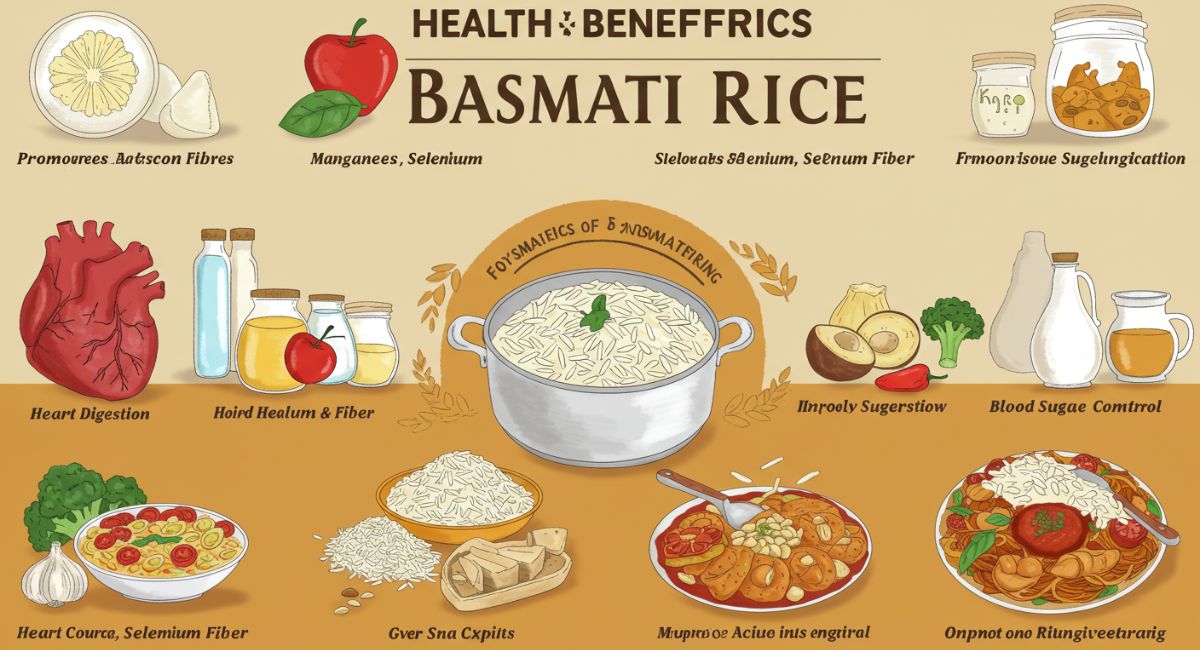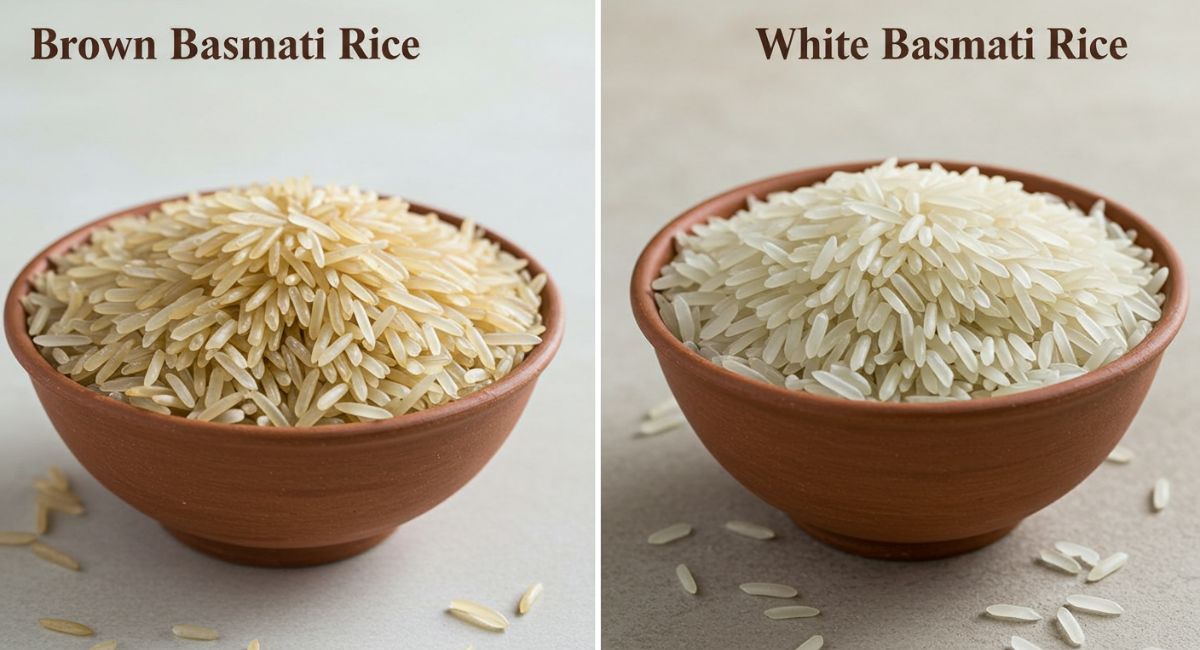Basmati Rice Benefits: Nutrition, Health, and Wellness
Basmati rice has long been celebrated not only for its unique aroma and fluffy texture but also for its wide range of health advantages. When exploring basmati rice benefits, it’s clear that this grain offers far more than just flavor on the plate. Known for its low glycemic index, basmati rice helps maintain steady energy levels, making it a smarter choice compared to regular white rice.
Its rich content of dietary fiber supports digestion and weight management, while essential nutrients like magnesium and B vitamins contribute to heart health, metabolism, and overall wellness. Being naturally gluten-free, it is also suitable for those with specific dietary needs. With so many nutritional advantages, basmati rice stands out as a wholesome addition to any balanced diet..
What Makes Basmati Rice Special?
Unlike regular white rice, basmati rice is long-grain, fragrant, and comes in both white and brown varieties. Its unique composition gives it a lower glycemic index (GI) compared to many other rice types, meaning it releases energy slowly and helps regulate blood sugar levels. Additionally, it contains essential nutrients like magnesium, fiber, B vitamins, and small amounts of protein.
Key Basmati Rice Benefits
1. Supports Weight Management
One of the most popular basmati rice benefits is its role in supporting weight loss and management. Because basmati rice—especially the brown variety—contains more dietary fiber, it helps you feel fuller for longer. This reduces overeating and unnecessary snacking. Moreover, its lower GI ensures a steady release of energy, preventing sudden hunger spikes.
2. Improves Digestive Health
The fiber content in basmati rice plays a vital role in improving digestion. It supports bowel regularity, reduces constipation, and feeds healthy gut bacteria. For those looking to maintain good gut health, brown basmati rice is particularly beneficial.
3. Heart-Friendly Grain
Cardiovascular health is another area where basmati rice benefits shine. Whole-grain basmati rice is rich in magnesium and fiber, both of which support healthy cholesterol levels and promote better heart function. Studies suggest that diets high in whole grains may lower the risk of heart disease.
4. Helps Manage Blood Sugar Levels
With its low to medium glycemic index, basmati rice is a smart carbohydrate choice for people with diabetes or those at risk of developing it. Unlike other rice types that can cause sharp spikes in blood sugar, basmati releases glucose slowly, keeping energy stable and reducing strain on insulin levels.
5. Rich in Essential Nutrients
Basmati rice isn’t just a filler on your plate—it contains valuable vitamins and minerals. These include:
- Magnesium for muscle and nerve function
- Thiamine (Vitamin B1) for energy metabolism
- Niacin (Vitamin B3) for healthy skin and digestive support
- Small amounts of protein to support overall nutrition
6. Naturally Gluten-Free
For individuals with gluten sensitivity or celiac disease, basmati rice offers a naturally gluten-free option that is both safe and nutritious.
Brown Basmati Rice vs. White Basmati Rice
While both varieties have health benefits, they differ slightly in nutrient content:
- Brown basmati rice: Contains more fiber, magnesium, and nutrients because it retains the bran layer. It is especially good for weight loss and blood sugar management.
- White basmati rice: Although lower in fiber, it still has a lower glycemic index compared to other white rice varieties. It’s light, fluffy, and easier to digest.
Choosing between them depends on your health goals. If you want higher fiber and nutrients, go for brown basmati. If you prefer lighter, faster-digesting rice, white basmati is a good option.
How Basmati Rice Compares to Other Rice Types
Compared to jasmine or regular white rice, basmati rice generally has:
- Lower glycemic index
- Longer, fluffier grains
- Distinct aromatic flavor
- More fiber (in the brown variety)
This makes it a superior choice for those looking for a balance of taste and health.
Tips for Including Basmati Rice in a Healthy Diet
- Portion control: Stick to about ½–1 cup of cooked rice per meal.
- Pair with protein: Combine with beans, chicken, fish, or lentils for a balanced meal.
- Add vegetables: Mixing rice with vegetables boosts fiber and nutrient content.
- Cook with minimal oil: Steaming or boiling basmati rice keeps it light and healthy.
Potential Downsides and Considerations
Although basmati rice benefits are numerous, moderation is key. Overeating any type of rice can lead to excessive calorie intake. Additionally, like most rice, basmati contains trace amounts of arsenic, a naturally occurring element found in soil and water. However, rinsing rice thoroughly and cooking it with extra water can reduce arsenic levels significantly.
Conclusion
Basmati rice is more than a fragrant side dish—it’s a wholesome grain that supports digestion, heart health, weight management, and blood sugar stability. Whether you choose white or brown basmati, you’re getting a grain that combines taste, tradition, and nutrition. With its numerous advantages, it’s no surprise that basmati rice has become a global favorite.
FAQs About Basmati Rice Benefits
- Is basmati rice healthier than regular white rice?
Yes, basmati rice—especially brown basmati—has a lower glycemic index, more fiber, and better nutrient content. - Can basmati rice help with weight loss?
Absolutely. Its fiber helps keep you full longer, and its slow energy release prevents overeating. - Is basmati rice suitable for diabetics?
Yes, due to its lower glycemic index, basmati rice is a healthier option for people managing blood sugar levels. - Does basmati rice contain gluten?
No, basmati rice is naturally gluten-free, making it safe for those with celiac disease or gluten sensitivity. - Should I choose white or brown basmati rice?
Both are healthy, but brown basmati has more fiber and nutrients. White basmati is lighter and easier to digest.




